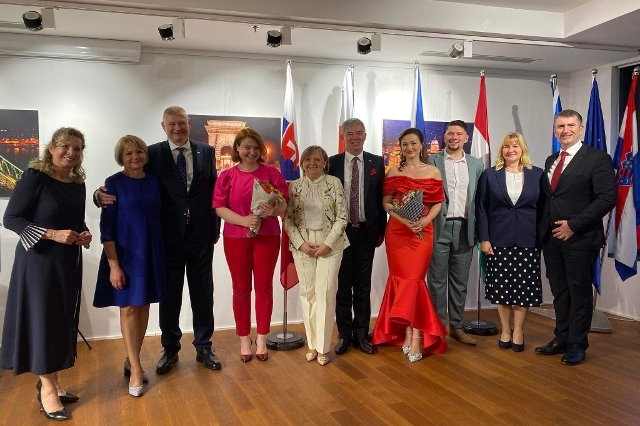"We Are a Sovereign Country"
01.03.2007 / 12:55 | Aktualizováno:
Rozhovor redaktora Christiana Neefa s ministrem Schwarzenbergem v časopisu Spiegel ze dne 19. 2. 2007 (v angličtině).
SPIEGEL: Minister Schwarzenberg, at the Munich Security Conference earlier this month, Russia's President Vladimir Putin warned the United States would spark a new 'arms race' by deploying missile defenses in Poland and the Czech Republic. Is he genuinely concerned or is it just hot air?
Schwarzenberg: It's well known that Moscow's own defense program is continuously developing. Some time ago, the Russians already proudly announced their new intercontinental missiles, whose warheads can change altitude and course to avoid even missile defense systems like this one. They're working on their own defense system and have set up a radar station near St. Petersburg. So I don't think we're facing dramatic changes.
SPIEGEL: You think Moscow isn't behind at all? The Americans in recent years have made a number of advancements...
Schwarzenberg: It's true the United States' defense capacity is
even greater; the United States is a much wealthier country, after
all. But this is a matter between Americans and Russians in which
we only play a minor role.
SPIEGEL:
The missile shield is actually meant to stop missiles from
Iran or North Korea. Russia considers this justification given by
Washington to be a pretext.
Schwarzenberg: I'm convinced Iran does not have the
capability to construct missiles with such a range. But Iran has
made great progress in terms of its technical abilities. The
Iranians have excellent scientists and are already building
respectable missiles. That means they can doubtless create an
intercontinental missile in the foreseeable future. The Russians
back then were able to do so pretty quickly too. Why should Iran
need 20 years?
SPIEGEL:
If Europe is really facing such a danger, why isn't NATO
taking charge of the appropriate defense measures?
Schwarzenberg: NATO wouldn't be out of the game if
European countries were to decide to reach into their coffers and
make a significant contribution. But for something like that to get
through the European parliaments, and for action to be taken -- it
takes time.
SPIEGEL:
Can you at least understand the Russians' concerns when
they complain about NATO moving closer and closer to its borders?
Schwarzenberg: What do you mean by "the Russians"?
The fact is that Russia is ruled in a more or less authoritarian
manner -- which means that Putin and his team know exactly what's
really going on. When I think through the speech Putin gave (at the
Munich Security Conference) again, I see a leitmotif running
through it: that of the Russian Federation's desire to be respected
and treated the same way the Soviet Union once was -- and a desire
for the same scale.
SPIEGEL:
In Munich, you reacted very emotionally to the charges
Putin levelled at the missile shield...
Schwarzenberg: Why emotionally? It was very
rational. I said the notion that there is not just a Russian zone
of influence but also a zone where the Russians have a veto right
merely gets a tired smile from me. We're a sovereign country, and
interference from third parties is likely to consolidate our
position.
SPIEGEL:
There is resistance to the US plans even within the Czech
Republic.
Schwarzenberg: Of course there's a lively discussion
-- across the entire political spectrum. And of course parliament
needs to make the final decision. We're only in the negotiation
phase; we have to see whether we can even achieve a sensible
agreement with the United States. And then we'll see whether we're
also able to get a majority.
SPIEGEL:
You've just recently tried to win over the mayors of 15
communities southwest of Prague which are located near the planned
radar facilities. Many weren't exactly enthusiastic.
Schwarzenberg: They were divided: Some were strongly
opposed, others more positive. They all have their experiences with
military training facilities in the region -- from the time of the
Third Reich to the time when the Soviets were here. My feeling is
more that they're trying to use the opportunity to get something
for their communities.
SPIEGEL:
The trend towards rejection of the missile shield is clear
throughout the country: Only 31 percent are in favor of the shield
-- and only on condition that Washington allows Czechs visa-free
travel into the United States.
Schwarzenberg: I hope Congress will act accordingly.
But of course the two things aren't related -- only to the extent
that the attitude of the Americans will probably be more favorable
than usual if the missile plans meet with approval.
SPIEGEL:
Poland and the Czech Republic, the "new Europe," have long
had the reputation of cooperating more with the United States than
with the European Union and the Germans in particular. Won't this
make things worse?
Schwarzenberg: The catch phrase about "old" and "new Europe"
no longer has any validity. But that people here aren't driven by
such powerful anti-American reflexes as elsewhere is true, thank
God, and it's also the case for Poland. That also has to do with
our history in the 20th century. But we are members of the European
Union and feel that way. We don't see trans-Atlantic ties as
contradicting that.






